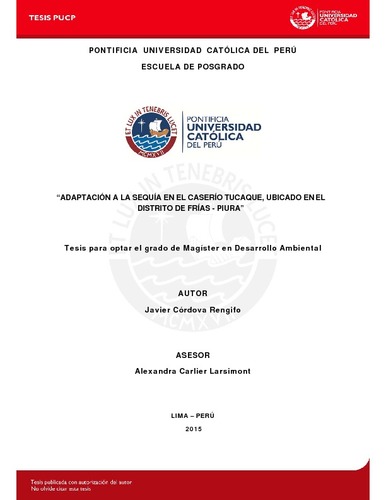| dc.contributor.advisor | Carlier, Alexandra | |
| dc.contributor.author | Córdova Rengifo, Javier | es_ES |
| dc.date.accessioned | 2015-10-22T16:43:27Z | es_ES |
| dc.date.available | 2015-10-22T16:43:27Z | es_ES |
| dc.date.created | 2015 | es_ES |
| dc.date.issued | 2015-10-22 | es_ES |
| dc.identifier.uri | http://hdl.handle.net/20.500.12404/6351 | |
| dc.description.abstract | El cambio climático va a promover la intensificación de periodos húmedos y secos. En esta tesis se ha optado por estudiar la forma de lidiar contra las épocas sin lluvia en el caserío Tucaque. La sequía representa un grave limitante tanto para el desarrollo económico como humano de cualquier población y más aún, debido a los obstáculos que disminuyen la capacidad adaptativa para este evento. Estas barreras implican a la escasez de recursos económicos; y a los factores sociales e institucionales. Estas últimas se reflejan en el caserío Tucaque en donde el individualismo reinante en el centro poblado, la débil gobernanza del lugar y la relación superficial con la Municipalidad Distrital de Frías no permiten un adecuado manejo de los años secos. Los periodos con escasez de agua van a seguir ocurriendo por lo que no basta con solo notificar cuáles son las trabas que impiden hacer frente a la sequía adecuadamente sino también; conocer las oportunidades que ella nos presenta. Es así que se tiene al Canal El Bronce, el cual está aminorando los efectos de la sequía; a la Ronda campesina de Tucaque, la cuál a pesar de las dificultades es una institución respetada y organizada en el caserío; a los conocimientos etnoclimáticos que pueden volver a ser revalorados frente a la carencia de estaciones meteorológicas; y al cultivo de la pitaya, la cual no requiere de mucha agua para su desarrollo y es un producto con grandes posibilidades económicas. Siendo la agricultura una actividad muy sensible a modificaciones en la variabilidad climática, las acciones que se tomen contra la sequía, van a encajar perfectamente en las medidas de adaptación al cambio climático. | es_ES |
| dc.description.abstract | Climate change is going to promote the dry and wet cycle’s intensification. This document tends to study the way how people deal with dry seasons in the community of Tucaque. Droughts limit the economic and human development. Even more if there are obstacles that retain the adaptative capacity to this event. These barriers are the economic resources scarcity and; social and institutional factors. The latter two are seen in Tucaque where individualism dominates its social life, where there is weak governance, and weak connections with Frías Municipality do not allow the right management of dry seasons. Droughts will continue happening so it is not enough to just point the hindrances of confronting them but it is a good idea to search the opportunities that can be used in order to take advantage of them as the Canal El Bronce, that is reducing drought effects; the Ronda Campesina de Tucaque, despite its difficulties it is a very respected and organized institution in the community; ethnoclimatic knowledge, that can be revalorated and; the pitaya farming, which does not consume much water for its growth and it is a product with big economic possibilities. Being the agriculture a very sensitive activity to modifications of climate variability, actions taken against droughts will perfectly fit in adaptation measures to climate change. | es_ES |
| dc.language.iso | spa | es_ES |
| dc.publisher | Pontificia Universidad Católica del Perú | es_ES |
| dc.rights | info:eu-repo/semantics/openAccess | es_ES |
| dc.rights.uri | http://creativecommons.org/licenses/by-nc-nd/2.5/pe/ | * |
| dc.subject | Sequías--Perú--Piura | es_ES |
| dc.subject | Cambio climático--Perú--Piura | es_ES |
| dc.subject | Piura--Condiciones ambientales | es_ES |
| dc.title | Adaptación a la sequía en el caserío Tucaque, ubicado en el distrito de Frías-Piura | es_ES |
| dc.type | info:eu-repo/semantics/masterThesis | es_ES |
| thesis.degree.name | Magíster en Desarrollo Ambiental | es_ES |
| thesis.degree.level | Maestría | es_ES |
| thesis.degree.grantor | Pontificia Universidad Católica del Perú. Escuela de Posgrado | es_ES |
| thesis.degree.discipline | Desarrollo Ambiental | es_ES |
| renati.discipline | 521547 | es_ES |
| renati.level | https://purl.org/pe-repo/renati/level#maestro | es_ES |
| renati.type | http://purl.org/pe-repo/renati/type#tesis | es_ES |
| dc.publisher.country | PE | es_ES |
| dc.subject.ocde | https://purl.org/pe-repo/ocde/ford#1.05.08 | es_ES |






